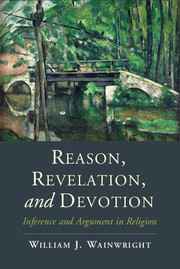Book contents
- Frontmatter
- Dedication
- Contents
- Acknowledgments
- Introduction
- 1 Four Examples of Religious Reasoning
- 2 The Purposes of Argument and the Person-Relativity of Proofs
- 3 Religious Reading and Theological Argument
- 4 Passional Reasoning
- 5 The Role of Rhetoric in Religious Argumentation
- 6 Reason, Revelation, and Religious Argumentation
- 7 Theology and Mystery
- Conclusion
- Notes
- Index
Conclusion
Published online by Cambridge University Press: 05 December 2015
- Frontmatter
- Dedication
- Contents
- Acknowledgments
- Introduction
- 1 Four Examples of Religious Reasoning
- 2 The Purposes of Argument and the Person-Relativity of Proofs
- 3 Religious Reading and Theological Argument
- 4 Passional Reasoning
- 5 The Role of Rhetoric in Religious Argumentation
- 6 Reason, Revelation, and Religious Argumentation
- 7 Theology and Mystery
- Conclusion
- Notes
- Index
Summary
I entered Kenyon College at eighteen as an aspiring poet with a strong interest in literary studies but encountered philosophy during my sophomore year. The departments at Kenyon and at the University of Michigan where I received my graduate training were largely analytic. I continue to regard myself as an analytic philosopher. The only text in my first course was Plato's Republic, however, and Plato remains my favorite philosopher. What initially struck me, and still does, is the way in which he weaves together closely reasoned pieces of analysis with myth, story, and symbol. Although Plato clearly believed that the latter are needed to express some truths or aspects of the truth, he employed them only after the resources of argument had been exhausted. This continues to seem to me the best way to do philosophy. I never lost the conviction that poetry, myth, symbol, and story can express truths and insights that can't be adequately expressed in other ways. Yet philosophy taught me that when poetry, story, symbol, and myth aren't tethered to reasoned argument and careful analysis, one runs the danger of falling prey to what Coleridge called “fancy” and distinguished from imagination. The latter, in his view, answered to something in reality. The former does not. These convictions have led to and shaped the understanding of the nature, role, and importance of religious argumentation expressed in this book.
Two facts are patently clear. As we saw in Chapter 2, philosophically sophisticated arguments are frequently deployed by adherents of the world's major religious traditions. What is equally clear, though, is that few of these arguments are universally persuasive. Not only do Christian arguments generally fail to convince Buddhists or atheists, for example, they often fail to convince many of their authors own co-religionists. In spite of the fact that both were Christians, Pelagius's arguments failed to convince Augustine, and Augustine's arguments failed to convince Pelagius. Chapter 2 argued that one of the main reasons for this is the person-relativity of most arguments. Two related sources of the person-relativity of religious proofs were explored in Chapters 3 and 4. The first is the embeddedness of the most interesting religious arguments in rich textual traditions. The second is that one's assessments of these arguments are deeply affected by one's possession of certain emotions, feelings, desires, and intuitions or by one's lack of them.
- Type
- Chapter
- Information
- Reason, Revelation, and DevotionInference and Argument in Religion, pp. 148 - 150Publisher: Cambridge University PressPrint publication year: 2015

